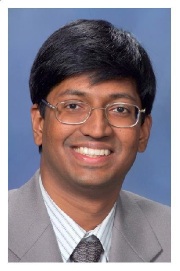EnergyCoupon: Theory and Practice of a Nudge System for Demand Response in a Smart Electricity Grid

Speaker: Srinivas Shakkottai
Affiliation: Texas A&M University
Abstract: We consider the general problem of resource sharing in societal networks, consisting of interconnected communication, transportation, and energy networks important to the functioning of society. In our example application, we consider a Load Serving Entity (LSE) trying to reduce its exposure to electricity market volatility by incentivizing demand response at the customer level. We assume that the LSE has a good estimate of the statistics of the wholesale price of electricity at different hours of the day, and wishes its customers to move a part of their consumption to times of low estimated prices. The LSE provides incentives via lottery tickets called “EnergyCoupons” to each customer based on the time and amount of electricity used. A lottery is held periodically using these coupons.
We begin with a theoretical model in which we pose the user decision problem as a mean field game (MFG), and the incentives question as one of trying to select a good mean field equilibrium (MFE). In such a framework, each agent (a participant in the societal network) takes a decision based on an assumed distribution of actions of his/her competitors and the incentives provided by the social planner. The system is said to be at MFE if the agent’s action is a sample drawn from the assumed distribution. We show the existence of such an MFE under general settings, and also illustrate how to choose an attractive equilibrium in the context of demand-response in the (smart) electricity network.
We next discuss how we designed and implemented the EnergyCoupon system to provide coupon incentives to users and collect their responses. We describe the system setup, key learning and prediction algorithms, as well as experimental results analysis. The experiment was run over residential participants through the summers of 2016 and 2017. The experimental results suggest behavioral changes in energy consumption can be achieved, which could be beneficial to both end users and LSEs.
Biography: Srinivas Shakkottai received a PhD (2007) in Electrical Engineering, from the University of Illinois at Urbana-Champaign. He was a post-doctoral scholar in Management Science and Engineering at Stanford University in 2007, and is currently an associate professor at the Dept. of ECE at Texas A&M University. His research interests include content distribution systems, economics of network resource allocation, game theory, wireless networks, and Internet data analytics.
Srinivas is the recipient of the Defense Threat Reduction Agency Young Investigator Award (2009) and the NSF Career Award (2012), as well as research awards from Cisco (2008) and Google (2010). He also received The Dept. of ECE Outstanding Professor Award (2013) and was selected as a TEES (College of Engineering) Select Young Faculty Fellow (2014) at Texas A&M University.
For more information, contact Prof. Suhas Diggavi (suhasdiggavi@ucla.edu)
Date/Time:
Date(s) - Nov 21, 2017
10:30 am - 12:30 pm
Location:
E-IV Tesla Room #53-125
420 Westwood Plaza - 5th Flr., Los Angeles CA 90095
